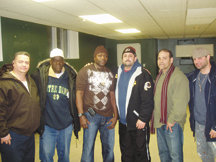Lee Lyons is a symbol in the Housing Authority, a symbol of recovery and a symbol of the struggle to stay clean. He has bad days. He curses. He’s not perfect.
He was once a symbol of wasted ability, a walking anti-drug advertisement. But for 11 years, Lyons has made the decision every day that he will not use drugs.
Now, he’s a symbol of hope for those struggling with addiction in the Hoboken housing projects, the 21 brick buildings on the west side of town.
Eight years ago, Lyons started a support group for recovering addicts that works alongside 12-step recovery programs. The group is local and informal, but it is consistent and accepting of any visitors.
“There’s a lot of drug activity down here, and there was no solution.” – Lee Lyons
________
Lyons invites concerned parents to come to the meetings, listen, or ask questions. “This meeting isn’t just for addicts,” he said.
He said too many families find themselves evicted from their apartments because one family member is suffering from addiction and acting out.
“I don’t think I’ve ever seen a person serve the community in the projects like Lee,” said Stu Chirichella, a recovering addict with 18 years clean.
The drug problem
“There’s a lot of drug activity down here, and there was no solution,” Lyons said. In the past, he said, addicts would be arrested, released, and – with no support system – would find themselves back in jail within weeks, if not days.
“The meeting was designed to be a solution to the problem,” Lyons said. “Twenty-five years in addiction…that’s something that I didn’t have.”
Another former addict, Anthony Mickel, agreed.
“They either told you to stop, or most guys died,” Mickel said. “There was no talk of recovery in the ’70s and ’80s.They considered it a moral disease, not a physical disease.”
When Lyons began the meetings, he only had the support of a few people.
The Housing Authority allowed him to use the space and a former municipal judge referred drug offenders, but other than that, it was word of mouth and flyer under doors.
Mickel and Lyons were the only two people in the meetings for the first four or five weeks. They were ready to pack it in when Henry Bentley showed up.
Eight years later, Bentley is still coming to the meetings. “They made me a believer,” he said.
Along with his group, Lyons said he always recommends the “guidance and structure” of programs like Alcoholics Anonymous or Narcotics Anonymous and for addicts to find a sponsor, someone who acts as a mentor during recovery.
The reach of Lyons’ group has been growing. Two Hudson County drug rehab programs recently started bussing in their patients to sit in at the meetings.
Over 30 addicts with varying lengths of sobriety sat in the community room two weeks ago, discussing the hard path to recovery.
Lyons wants to continue the expansion in conjunction with the Housing Authority, organizing interventions and accepting referrals.
Paving the road to recovery
One woman who has been with the group for seven years has herself become a drug counselor.
During the day she interacts with some of the program-enrolled addicts who visit the group at night. At night, she is interacting as a former addict herself.
Speaking before the group, she told tales of desperation while using drugs, the rock-bottom turnaround, and the struggle to regain control of her life and the trust of her family and friends.
“I don’t think there’s anything I haven’t shared with this group,” she said in an interview. “I couldn’t have overcome all that by myself.”
Michael DeJesus visited the group in the past, but slipped up and relapsed back into addiction.
Out on parole and with a history of addiction, DeJesus said he needed the group again. “If I didn’t know these people…,” DeJesus said, then shook his head.
Several speakers during the meeting spoke about the pain they caused family members while suffering addiction, and the uphill battle to make sure they don’t inflict that pain on their family again.
Speaking about his mother, who has been caring for his children and dealing with medical issues, one man said, “I’m not killing her with my disease anymore, but I’m killing her ’cause I can’t take care of my kids.”
Recovery presents addicts with many challenges that can lead to relapse, so Lyons has given them somewhere to meet other people who have faced or are facing the same difficulties.
Lyons spoke at the meeting and shared a difficult situation of his own: Taking his daughter away from her mother who was using drugs.
“The worst thing you can do is take a daughter away from her mother, and that’s what I had to do last week,” he said. “It’s hard on the kid and it’s hard on the mother, and I’m like the bad guy.”
“You cannot undo what you did in the past,” he told the other addicts. “That’s why this program is set up to find solutions.”
The Hoboken Housing Authority is conducting renovations on the community room at 411 Harrison St. over the next few months and the group is looking for an alternative meeting space. For more information on the recovery group or to offer space for a meeting during renovations, call Lyons at (201) 780-3818.
Timothy J. Carroll may be reached at tcarroll@hudsonreporter.com.
